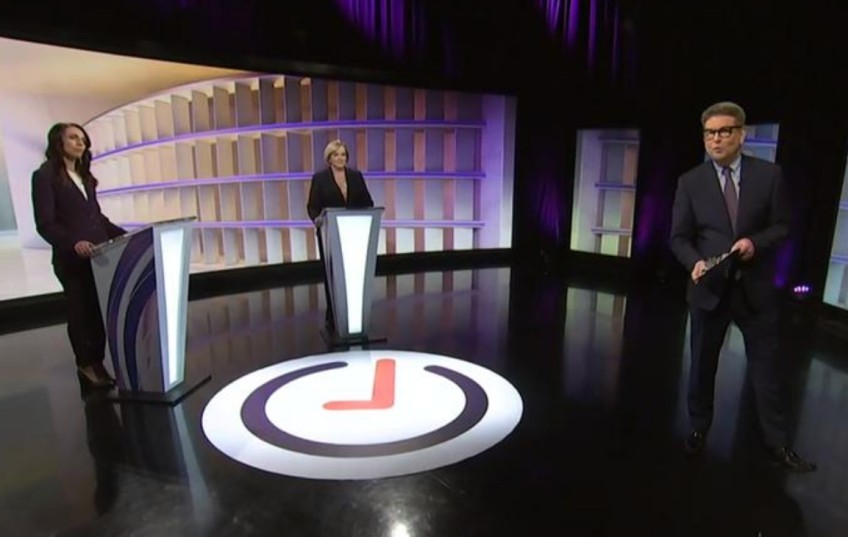Leaders debate 'a boost for National but the race by no means over'

Power Play - Judith Collins needed to perform in the first major televised election campaign, and she did.
She may not have "crushed" Jacinda Ardern but certainly put her under pressure.
Jacinda Ardern and Judith Collins at the first leaders' debate, with moderator John Campbell. Photo: Fair use / Screenshot
The energy of the Labour leader was flat, and her National Party opponent took advantage with plenty of eye rolling and eyebrow raising. Overall, though, it was lacklustre affair.
Like everything, Covid left its mark. Auckland was still in alert level 2 so there was no live audience to feed off and interact with. Even the large media contingent that usually attends was restricted to 10 journalists, watching from an area well away from the studio itself.
Read more on the debate:
Leaders' debate: Collins and Ardern, blow by blow
The debate rounded off a shambles of a week for National, after an awkward virtual campaign launch and on the back foot over a $4 billion bungle in its economic plan. Collins was the obvious underdog, the 1 News - Colmar Brunton poll unveiled an hour before the debate confirming the 17-point gap National has to bridge, so she had nothing to lose.
She had no qualms about taking on Ardern directly, interrupting her, challenging her and openly scoffing during some of the more heated exchanges.
Ardern pushed back in the latter part of the debate, aware many of her points were getting lost as Collins simply talked over her to make her own. Afterwards Ardern said she was happy with her performance, telling reporters "blood sport" was not her style.
But this was a debate more about personalities than an intense policy debate, with voters learning little new about their respective plans.
Except that Collins didn't actually mean it when she said on the campaign trail the government's freshwater reforms would "gone by lunchtime" - in fact she committed last night to scrapping only one, the ban on irrigation, and the rest would be "reviewed".
While the shadow of Covid-19 still lies over New Zealand, specific references to either the virus or the recession were surprisingly few and far between.
Climate change, poverty, inequality, housing and job creation were the focus - all entwined in some way with the pandemic but the discussion was much broader. The tone set perhaps by the first, specific question about the timetable of a hospital build when New Zealand faces a huge economic crisis, across the country.
Vulnerabilities for Ardern include the abandoned capital gains tax and child poverty; under attack, that was when she became the most animated. She deployed few attack lines of her own, but tax was one, repeating Labour's message that National's $4 billion package of tax cuts was "irresponsible". No mention though - surprisingly - of the $4b hole in its economic plan.
A subtle reminder however by Ardern in her closing statements about why she has attained such personal popularity - her handling of the disasters that have struck New Zealand in the last term.
Collins has not had the time for the obligatory "getting to know you" exercise with voters and last night was her opportunity to perform in a forum where politicians can deploy as much personality as they want, or they can.
She was sharp and confrontational and knew her policies; she became emotional when talking about the challenges facing the farming sector and a brief mention of her Samoan husband when asked about the pressures on many New Zealand families. Acknowledging the effects of poverty and restating the commitment not to slash benefits could help blunt Labour's line National would implement a slash and burn programme of austerity if elected, but first voters have to trust what she says.
It was much needed boost for the National team but the race is by no means over.
Ardern is a formidable opponent and not one likely to buckle under the pressure. While not into political "bloodsport", she may just need to put on the gloves for next one.





















